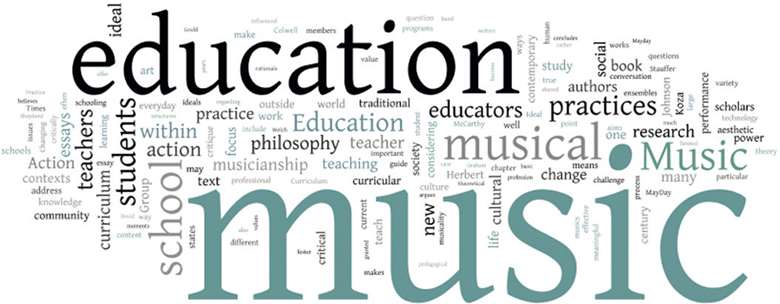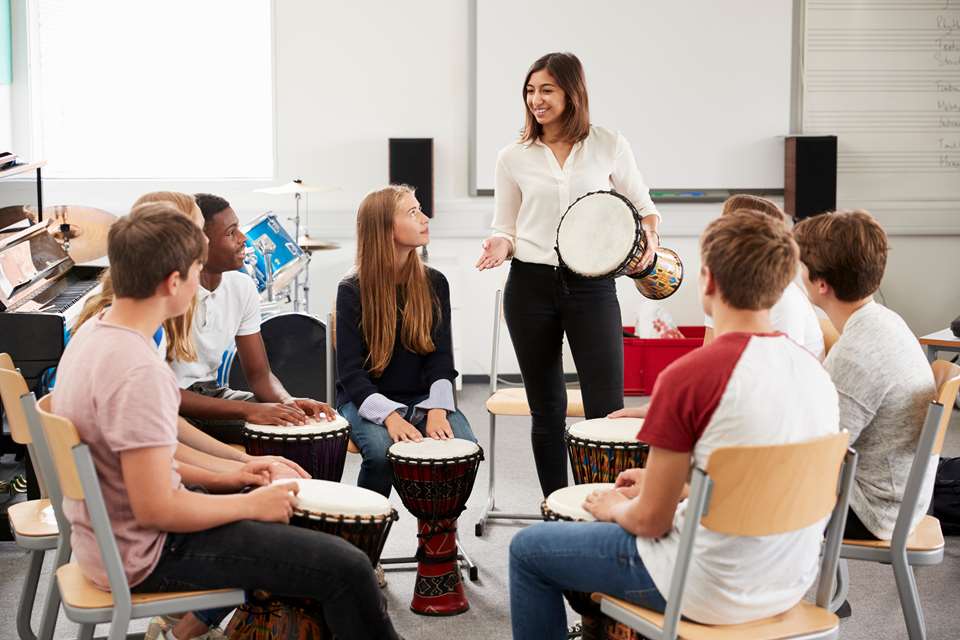Ofsted music subject report: interview with HMI Christopher Stevens
Anthony Anderson
Wednesday, November 1, 2023
What does Ofsted's new music subject report mean for schools, and what does it have to say about pupils' access to music? Dr Anthony Anderson, research fellow in music education at Birmingham City University, interviews Christopher Stevens, Ofsted subject advisor for music.

If schools had newsstands, the latest Ofsted report for music would have hit the racks at the back end of September. There may not be cries of ‘Extra! Extra!’ emanating from newspaper sellers on street corners about this new Ofsted edition, but music teachers and senior leaders alike may choose to read, and reflect on, what Ofsted says, with their school music provision in mind.
Ofsted, the schools inspectorate in England, has published three subject-specific reports on music, the most recent appearing in 2012 (over 10 years ago). A lot has happened since that time and the new report, Striking the Right Note, covers a great deal of ground. It begins by outlining some of the recent policy contexts in music education, then gives its main findings and recommendations, before presenting a more detailed commentary for primary and secondary schools.
Ofsted's role
I caught up with HMI Christopher Stevens, subject lead for music, to discuss the report and ask a little more about some of the key themes it addresses. Stevens is a former Advanced Skills Teacher in music and was a senior leader at a variety of schools in Birmingham, while holding other senior roles. He joined Ofsted around four years ago, before stepping into the subject lead role two years ago.
Stevens is clearly proud of the publication: ‘We've always had a proud history of publishing’, he says with a smile, ‘and [those publications] matter because Ofsted is able to give a unique perspective and insights into what's happening in a much bigger picture across the country.’
The place of Ofsted in the national education debate is one into which this report also fits: ‘Ofsted's role is a force for improvement – this idea that we can make a contribution through our insights to supporting and improving the quality of music education in the country.’
Current landscape
With Stevens occasionally waving a blue biro while talking, we turn our attention to some of the many key issues in the Ofsted report. One of the largest is barriers to music education. Stevens is at pains to point out that it's not all bad news and that ‘where schools are getting it right…there was a real focus on what it was they hoped children would be able to know and do as a result of learning the music curriculum’. However, he also highlights the barriers in that, in some instances, ‘children were doing music, but there wasn't always a deliberateness about why they were doing those things and what would follow’.
He also mentions the continuing challenges that education in a post-Covid environment presents for music education and how this can create barriers in schools. ‘In schools where we saw music thriving – that is, children doing well, achieving well – there were lots of ensembles, and leaders understood the importance of the taught curriculum. What Covid has done in some cases is upset that balance, so there were some instances where schools were really struggling to get some of those wider aspects of their music education up and running again, for a variety of reasons. Children are reluctant to come back, or have stopped learning instruments. We visited 25 primary schools and in half of those there wasn't currently any extra music curricular going on.’
Confidence and quality
Pausing briefly, Stevens goes on to outline other barriers for children in primary schools, in which he includes teachers' ‘lack of confidence in delivering the curriculum’ and even their ‘own-recognised lack of musicianship’. Circling his hand in the air, Stevens relates one of these instances: ‘I remember a music teacher saying to me, very honestly, “Chris, I'm struggling to give feedback because I'm not really sure what quality sounds like”’. Resting his hand thoughtfully under his chin, he continues: ‘But it's not about being an expert in music; it's having sufficient knowledge to model and demonstrate the curriculum well and what schools are doing about that.’
Building primary teachers' confidence, not least by increasing the time they receive on music as part of their training, may perhaps help address Ofsted's observations here.
Key Stage 3 curriculum
Progressing from ‘barriers’ to ‘disadvantage’, Stevens again acknowledged that there was ‘a thriving culture of extra-curricular activity’, but that in secondary schools in particular there ‘wasn't that culture’, meaning ‘you could only get that kind of critical knowledge, that understanding, if you were having paid-for lessons, which, of course, some families can't afford.’ Within this frame, Stevens stressed the importance of ‘a well-planned sequence throughout the Key Stage 3 curriculum that is designed to prepare all children for further musical study.’
This would seem to be a genuine pressure point for music education in schools, especially as the previous Ofsted music report from 2012 identified the same area of difficulty. Although Stevens acknowledged the pressure on school budgets and how ‘in some cases that means… they've withdrawn funding that perhaps previously was there for instrumental lessons’, he continued to make the point that ‘it's about recognising the place of the music curriculum that all children are entitled to, and where that's right and well-planned and supported by extra-curricular clubs, children do and can thrive, and can be well-prepared for their next steps. If that's not there and that's not happening, that's when there's an over-reliance on children having to rely on paid tuition.’
It seems that this is a complex issue and one that schools will need to consider further.
Additional educational needs
When thinking about pupils with additional needs and requirements, this area is another commonly linked with disadvantage, although the term ‘SEND’ appears only twice in the Ofsted report. When I ask Stevens about this, his reply is earnest and reflective, and highlights the importance of a curriculum for all:
‘One of the things we were considering all the time was: is this curriculum's intent, the way it's designed, actually supporting all pupils, including those with SEND? The report says there are some weaknesses in the way curriculums have thought about planning, and those weaknesses also impact on children with special educational needs. So, they were very much at the forefront of our thinking when we were writing the report.’
Stevens places emphasis on teachers carefully considering their curriculum ‘adaptions’, through having a clear pedagogy in mind. ‘It's about thinking – what do we want our children to be able to learn and do as a result of learning this curriculum? What might some children need in order to be able to achieve those things? There might be all sorts of adaptions to be considered, but that thinking can't be done until you're actually clear about what it is you want all children to be able to do and learn.’
Key Stage 5
I was keen to ask Stevens about the lack of provision for music in Key Stage 5; was this something Ofsted was concerned about? Stevens refers me to the Ofsted document we're discussing:
‘Of the 25 schools we visited, the report says, very few were offering Key Stage 5 music, and the report attempts to explain some of the reasons why that might be the case.
‘Your question is, “Is Ofsted concerned about it?” The point is we want pupils to be prepared and there's a broader question here: is the curriculum helping pupils to be well prepared? That's the question for school leaders to consider, so yes, the report does highlight that – the national statistics which we quote at the start of the report show that to be the case.’
Access to the curriculum is coming into view in our conversation, including at Key Stage 5. Stevens expands on this: ‘Obviously, we want young people to have the opportunity to study music and they want to do that through a broad and balanced curriculum that prepares them well. What the report highlights is that in some cases, that might not be possible, because of the curriculum, and the way it's being delivered in some schools, and that obviously is a concern.’ Where Ofsted talks of a concern, more discussion may follow and this debate is an area which is likely to recur in educational conversations for the foreseeable future.
Composition
Composition emerged as another area of focus in the new Ofsted report. Stevens adjusted his tie as he warmed to this theme: ‘It's a really important part of the national curriculum, so it was always going to be a focus for us in this report about what schools are doing. First: is it happening? And second: how are schools actually helping children to become more sophisticated in their responses in terms of composition?’
Stevens was careful to explain what he described as ‘compositional activity’, where it was not always clear ‘why they were doing that or what they hoped to get out of it’. For Ofsted, thinking about composing as a means of facilitating musical development would therefore seem to be an important focus: ‘It's stated in the report that there was perhaps an assumption that if children just did those things [composing activities] they would somehow get better at composition, whereas schools that were more deliberate… they'd thought about those blocks, rather than doing lots of composition, so it was building.’
One aspect discussed was how whole-school approaches may cause difficulties; for example, where teachers were ‘routinely asked to photograph and make records of the children's work… in those terms, actually, [it] was telling the teachers very little about the quality of musical responses… it was detracting from actually giving in-the-moment feedback and taking them away from musical interactions with children.’ There is clearly a great deal for schools to consider and digest in this report.
Extra-curricular provision
Music in schools is about the curriculum children and young people experience both in and outside of lessons, and it doesn't take long before the interview broaches this subject. Extra-curricular provision is specifically mentioned in the report and I was keen to explore Ofsted's expectations. Stevens nods, saying ‘I'm glad this has come across, that extra-curricular is an important part of a rounded music education in a school. We consider extra-curricular clubs as part of our personal development judgement in our framework… we'll always be interested to know what a school is doing to promote children's talents and interests, what the breadth of opportunities is. That's something we'll always look at on inspection.’
Extra-curricular provision is looking like it's pretty important, although Stevens is clear that there are no specific Ofsted expectations of what schools should offer. ‘We don't specify what it might look like for particular subjects’, he says, ‘but it's obviously always a consideration for us’. So, what is the role of the Striking the Right Note report in this context? Stevens outlines this, clearly relishing talking about this part of his inspection work: ‘Hopefully, what this report does is it re-emphasises that bit which says, actually, if schools are looking to think about improving their curriculum, and they're looking to develop it (an important consideration in the context of music education), our framework is about asking the bigger question. To say: is there a wide range of opportunities for children to explore their talents and interests within the school? That's an important part of our education inspection framework.’
Extra-curricular provision is an area on which Ofsted clearly focuses its attention, and no less so for music. When I asked if a school not offering a broad range presented a problem, Stevens was phlegmatic but nevertheless outlined its significance: ‘It would be something you'd want to explore. When we look at personal development and come to a judgement, it's important to recognise that there's a number of aspects we consider… so we'd have to take all that evidence in the round. But if there was a situation where we thought those opportunities were limited, we would want to explore this. We'd want to know why and what the school's doing about it, because it's an important part of a broad and rounded education that children have those opportunities.’
A word of thanks
As is so often the case in the most fascinating discussions, time had passed quickly. So many of the issues we'd discussed are the heartbeat of music teachers' and school leaders' daily work with young people. As we concluded our conversation, Stevens expressed his thanks to the music-teaching profession: ‘It's quite clear from our report that a lot of music teachers are working exceptionally hard to make music, that they understand the importance of that to young people's lives… and, really, just a big thank you for what they're doing, because the circumstances some of them are working in after the pandemic is not easy.’
The new Ofsted report is now off the newspaper stands and firmly in the hands of music teachers and senior leaders. Whatever your views about it, thinking about the report and how it might affect how music is taught in schools and experienced by young people, is going to continue to be important. If you haven't yet, it's certainly time to read all about it.
Read the full report: Striking the Right Note




